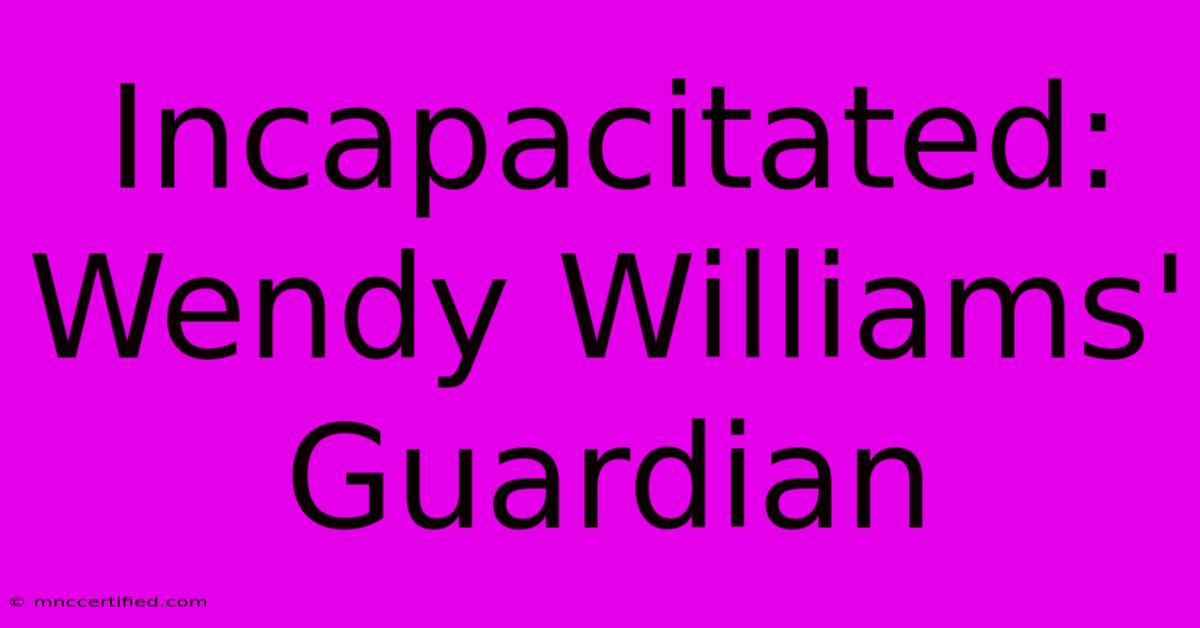Incapacitated: Wendy Williams' Guardian

Table of Contents
Incapacitated: Exploring the Guardianship of Wendy Williams
Wendy Williams' highly publicized struggles with health and well-being have thrust the topic of guardianship into the spotlight. This article delves into the complexities surrounding her guardianship, exploring the legal processes involved, the concerns raised, and the ongoing implications for her life and legacy.
Understanding Guardianship
Guardianship is a legal process where a court appoints a person or organization (a guardian) to manage the affairs of an individual deemed incapable of managing their own life. This incapacity can stem from various factors, including severe illness, cognitive impairment, or mental health challenges. There are two main types:
- Guardianship of the Person: This focuses on personal care decisions, including medical treatment, living arrangements, and daily activities.
- Guardianship of the Estate: This involves managing the individual's financial affairs, including assets, investments, and debts.
In Wendy Williams' case, the specifics of her guardianship orders are subject to legal confidentiality, but public reports suggest elements of both types were involved.
The Case of Wendy Williams: A Timeline of Events
Understanding the events leading to the establishment of Wendy Williams' guardianship requires examining her public struggles. Reports of her battling Graves' disease, addiction issues, and other health problems painted a picture of someone struggling with her ability to manage her affairs. This led to intense scrutiny from the public and, ultimately, legal intervention. While specific details remain confidential, the process involved petitions, court hearings, and ultimately, the appointment of a guardian.
Key Players and Concerns
The appointment of a guardian for Wendy Williams sparked debate and raised several concerns:
- The Role of the Guardian: The guardian's responsibility is to act in the best interests of the individual under their care. However, concerns about potential conflicts of interest or limitations on the ward's autonomy often arise.
- Family Dynamics: Public reports highlighted familial disputes, adding another layer of complexity to the legal proceedings. The involvement of family members in guardianship cases frequently introduces emotional and potentially adversarial elements.
- Public Perception vs. Legal Reality: The intense media coverage surrounding Wendy Williams' situation created a public narrative that may not accurately reflect the legal realities of her guardianship. Distinguishing between speculation and verifiable facts is crucial.
The Importance of Privacy and Confidentiality
It's essential to acknowledge the importance of respecting Wendy Williams' privacy throughout this process. Guardianship proceedings are often confidential to protect the vulnerable individual's dignity and autonomy. While public interest is understandable, responsible reporting must balance this with the need for discretion.
Navigating the Legal Landscape: Guardianship and the Law
Guardianship laws vary by jurisdiction. Understanding the specific legal framework within which Wendy Williams' case unfolded is vital for a comprehensive understanding. Key elements include:
- Standards of Incapacity: Courts apply specific legal standards to determine whether an individual lacks the capacity to manage their own affairs. These standards can differ, making comparisons between cases difficult.
- Due Process Rights: Individuals facing guardianship proceedings have legal rights, including the right to legal representation and the right to challenge the proceedings.
- Periodic Reviews: Guardianship orders are usually subject to periodic review by the court to assess the individual's ongoing needs and the guardian's performance.
The Future and Lessons Learned
Wendy Williams' case serves as a poignant example of the complexities surrounding guardianship and the challenges faced by individuals struggling with health issues and their families. The situation underscores the importance of:
- Early Intervention and Support Systems: Proactive support networks can help individuals manage their affairs and avoid the need for guardianship.
- Transparency and Accountability: Clear legal frameworks and robust oversight mechanisms are vital to ensure that guardians act in the best interests of their wards.
- Respecting Individual Autonomy: Even in cases of incapacitation, efforts should be made to preserve as much autonomy as possible for the individual involved.
The story of Wendy Williams' guardianship remains a developing narrative. This article provides an overview of the key issues involved, highlighting the complexities of the legal process and the importance of responsible and informed discussion. Further research and informed discussions are essential to navigate the sensitive issues surrounding this topic.

Thank you for visiting our website wich cover about Incapacitated: Wendy Williams' Guardian. We hope the information provided has been useful to you. Feel free to contact us if you have any questions or need further assistance. See you next time and dont miss to bookmark.
Featured Posts
-
Mack Brown Fired Unc Parts Ways
Nov 27, 2024
-
Former Nh Ler Bissonnette Assault Details
Nov 27, 2024
-
Wendy Williams Permanently Incapacitated
Nov 27, 2024
-
Barcelona V Brest Preview Match Analysis
Nov 27, 2024
-
California Auto Insurance Card
Nov 27, 2024